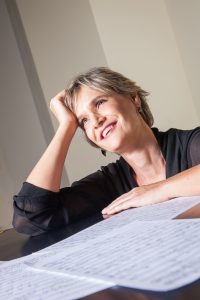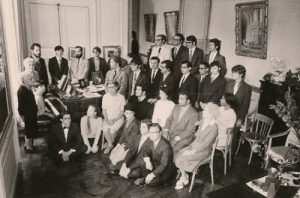Pianist Ingrid Barancoski reflects on her year in Southampton
 Dr Ingrid Barancoski, from the Villa-Lobos Institute at UNIRIO (Universidade Federal do Estado do Rio de Janeiro) reflects on her year in Southampton researching Nadia Boulanger and Almedia Prado:
Dr Ingrid Barancoski, from the Villa-Lobos Institute at UNIRIO (Universidade Federal do Estado do Rio de Janeiro) reflects on her year in Southampton researching Nadia Boulanger and Almedia Prado:
In June 2014, I was reading the book entitled The musical work of Nadia Boulanger, and found it fascinating. Researching about the author, Prof. Jeanice Brooks, I came across the University of Southampton. At that point of my life, I was already been teaching at UNIRIO (Federal University of Rio de Janeiro State) for 16 years, and it was time for a sabbatical. I had already chosen a research topic: the correspondence between Brazilian composer Almeida Prado (1943-2010), one of the most important names in Brazilian contemporary music, and the French teacher Nadia Boulanger (1887-1979), an icon of twentieth-century music. I decided to e-mail Prof. Brooks to inquire about the possibility of a sabbatical at the University of Southampton, and she answered positively next day! To make a long story short, on November 2015 I was finally arriving in Southampton, supported by a research grant from the Brazilian government through CAPES (a department from our Ministry of Education). It was the beginning of a rich 10-month time period of my academic and also personal life.
Besides the interesting conversations with Brooks about Boulanger, and the varied cultural activities on campus, several other opportunities were unique. For example, I had a very warm audience at the recital of Almeida Prado’s music I gave in the Turner Sims Concert Hall in February 2016. The work people clearly enjoyed the most was Cores, construções & texturas: sonora arquitetura:
I was surprised because it was the longest work on the programme, but this made me realise the strength of a clear programme structure, in addition to the reception of a unique timbristic treatment of the piano.
From Southampton it is easy to get to Paris, and I was able to spend plenty of time in the Bibliothèque Nationale de France with the archives of Nadia Boulanger. There I could find also letters from other composers and personalities who were close to Boulanger in the sixties and seventies, names such as Madeleine Lipatti, Idil Biret, Jean Françaix, and Igor Markevitch. Researching through documents of the archive I also assembled material for a new research project, devoted to other Latin-American composers who studied in France with Nadia Boulanger, coming from countries such as Mexico, Cuba, Chile, Argentina, Colombia, and Peru. I am beginning to work on this subject right now, and it can reveal a whole new world of information.
Another archive that I had the oportunity to visit was the one at the Conservatoire National Supérieur de Musique et Danse de Lyon, with Boulanger’s teaching materials. And I was lucky to find there two original manuscripts by Almeida Prado – Symphony No.1 (1970), which was dedicated to Mlle Boulanger, and the cantata Liber genesis (1971). Both were composed while Prado was studying with her in Paris (he studied with Messiaen and Boulanger from 1969 through 1973).

Back in Brazil since September 2016, and after such a productive period, some publications from my research are already available, including this overview. Since one can find only very basic information in Portuguese about Nadia Boulanger, I decided to translate an article by Jeanice Brooks, the translation is now available.
And it looks like people in Brazil are beginning to discover who Nadia Boulanger was.
My students here in Rio were very curious about my experiences in England, and have heard a lot of stories about Southampton. They will soon be learning music by British composers, thanks to Prof. David Owen Norris, who was very kind to introduce me to a large repertoire of British music. I have been reading and discovering fascinating piano pieces by composers such as Alan Clarke and George Dyson. It is great to have new music to teach and to perform!
So good to be back home, with my family, students and colleagues again. But I hope I can go back to England and to Southampton in the near future, and visit my new friends, who are also very welcome to come to Rio anytime!
Thank you, Music at Southampton!

